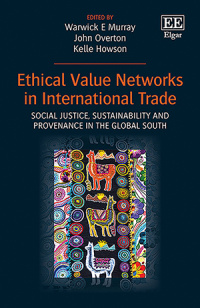Hardback
性别,一代和贫穷
Exploring the ‘Feminisation of Poverty’ in Africa, Asia and Latin America
9781843769927 爱德华·埃尔加出版社
在性别中,基于冈比亚,菲律宾和哥斯达黎加的近期现场工作,世代和贫穷的西尔维亚颂歌挑战了“贫穷的女性化”。对基层的220多名男女以及国际机构,政府部门和非政府组织中的40名专业人士的访谈强调了建立任何一般倾向于扩大收入贫困中性别差异的困难,或household heads to be the ‘poorest of the poor’. While not denying a ‘female bias’ in material privation, a more important and consistent pattern is that women are bearing an ever-greater burden of responsibility for household survival, and under especially exploitative conditions in male-headed units. These findings lead Chant to propose a more elaborate and nuanced construction of the ‘feminisation of poverty’ which incorporates inputs as well as incomes and takes greater account of gender relations within the home. This not only stands to enrich gendered poverty analysis, but to provide a more appropriate basis for policy interventions.
More Information
备受好评
内容
More Information
The ‘feminisation of poverty’ is widely viewed as a global trend, and of particular concern in developing regions. Yet although popularisation of the term may have raised women’s visibility in development discourses and gone some way to ‘en-gender’ policies for poverty reduction, the construct is only weakly substantiated. Its over-emphasis on income and on female household headship also conveys little of the contemporary complexities of gendered disadvantage.
在性别中,基于冈比亚,菲律宾和哥斯达黎加的近期现场工作,世代和贫穷的西尔维亚颂歌挑战了“贫穷的女性化”。对基层的220多名男女以及国际机构,政府部门和非政府组织中的40名专业人士的访谈强调了建立任何一般倾向于扩大收入贫困中性别差异的困难,或household heads to be the ‘poorest of the poor’. While not denying a ‘female bias’ in material privation, a more important and consistent pattern is that women are bearing an ever-greater burden of responsibility for household survival, and under especially exploitative conditions in male-headed units. These findings lead Chant to propose a more elaborate and nuanced construction of the ‘feminisation of poverty’ which incorporates inputs as well as incomes and takes greater account of gender relations within the home. This not only stands to enrich gendered poverty analysis, but to provide a more appropriate basis for policy interventions.
This volume will not only be an important resource for scholars of development, gender and area studies in Africa, Asia and Latin America, but also for professionals and activists working towards the elimination of poverty and gender inequality at national and international levels.
在性别中,基于冈比亚,菲律宾和哥斯达黎加的近期现场工作,世代和贫穷的西尔维亚颂歌挑战了“贫穷的女性化”。对基层的220多名男女以及国际机构,政府部门和非政府组织中的40名专业人士的访谈强调了建立任何一般倾向于扩大收入贫困中性别差异的困难,或household heads to be the ‘poorest of the poor’. While not denying a ‘female bias’ in material privation, a more important and consistent pattern is that women are bearing an ever-greater burden of responsibility for household survival, and under especially exploitative conditions in male-headed units. These findings lead Chant to propose a more elaborate and nuanced construction of the ‘feminisation of poverty’ which incorporates inputs as well as incomes and takes greater account of gender relations within the home. This not only stands to enrich gendered poverty analysis, but to provide a more appropriate basis for policy interventions.
This volume will not only be an important resource for scholars of development, gender and area studies in Africa, Asia and Latin America, but also for professionals and activists working towards the elimination of poverty and gender inequality at national and international levels.
备受好评
‘For practitioners and students of development, and library collections on women in development or comparative development. Highly recommended.’
- J.A.Fiola,选择
‘Sylvia Chant provides the most lucid treatment to date of the debate over the relationship between gender and poverty, and, based on new research from Africa, Latin America and Southeast Asia, critically engages and moves the discussion beyond the taken-for-granted assumptions that tend to govern this issue. Essential reading for scholars and policymakers alike.’
- Maxine Molyneux,英国伦敦大学
‘Sylvia Chant’s important new book, Gender, Generation and Poverty, challenges the widespread, uncritical belief in the feminisation of poverty – a central trope in development discourse, which explains both the nature of (and potential solutions for) global poverty. Drawing on rich, carefully documented case studies from The Gambia, Philippines and Costa Rica, Chant amply demonstrates the weaknesses of the feminisation of poverty perspective, particularly its tendency to link poverty to women, rather than gender relations, to emphasise women as victims, rather than agents, and to measure poverty by income privation, rather than grassroots subjective experiences. Chant calls for a more nuanced approach; one that pays attention to context, to the impact of gender relations between men and women and to the way generational change affects the gendered experience of poverty. Gender, Generation and Poverty thus has profound implications for both development praxis and theory. It should be required reading for anyone concerned with avoiding “cookie-cutter” approaches to understanding and alleviating poverty in an increasingly complex, unequal and insecure world. I think it is a landmark study, bringing a crucial, critical eye to a long-held “truism” of development thinking and practice.’
– Jane L. Parpart, Dalhousie University, Canada and Visiting Professor, LSE, UK
- J.A.Fiola,选择
‘Sylvia Chant provides the most lucid treatment to date of the debate over the relationship between gender and poverty, and, based on new research from Africa, Latin America and Southeast Asia, critically engages and moves the discussion beyond the taken-for-granted assumptions that tend to govern this issue. Essential reading for scholars and policymakers alike.’
- Maxine Molyneux,英国伦敦大学
‘Sylvia Chant’s important new book, Gender, Generation and Poverty, challenges the widespread, uncritical belief in the feminisation of poverty – a central trope in development discourse, which explains both the nature of (and potential solutions for) global poverty. Drawing on rich, carefully documented case studies from The Gambia, Philippines and Costa Rica, Chant amply demonstrates the weaknesses of the feminisation of poverty perspective, particularly its tendency to link poverty to women, rather than gender relations, to emphasise women as victims, rather than agents, and to measure poverty by income privation, rather than grassroots subjective experiences. Chant calls for a more nuanced approach; one that pays attention to context, to the impact of gender relations between men and women and to the way generational change affects the gendered experience of poverty. Gender, Generation and Poverty thus has profound implications for both development praxis and theory. It should be required reading for anyone concerned with avoiding “cookie-cutter” approaches to understanding and alleviating poverty in an increasingly complex, unequal and insecure world. I think it is a landmark study, bringing a crucial, critical eye to a long-held “truism” of development thinking and practice.’
– Jane L. Parpart, Dalhousie University, Canada and Visiting Professor, LSE, UK
内容
内容: Preface 1. Introduction 2. Analysing Poverty from a Gender Perspective 3. The ‘Feminisation of Poverty’ in the Global South: Assertions, Agendas and Evidence 4. Gender, Generation and Poverty in The Gambia 5. Gender, Generation and Poverty in the Philippines 6. Gender, Generation and Poverty in Costa Rica 7. Conclusion Bibliography Index





